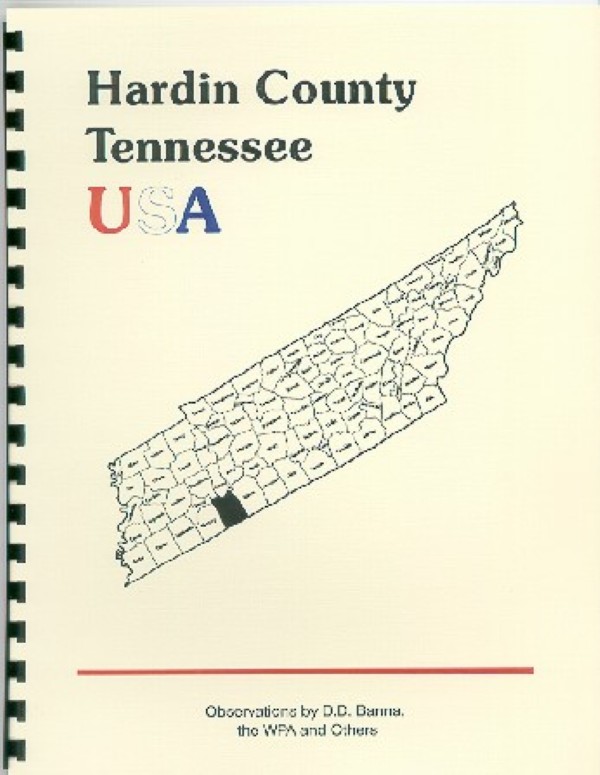Early days in Hardin
County, TN, recalled in this spiral bound booklet compiled
from excerpts from the rare 1887 book: History of Tennessee,
originally published by Goodspeed Publishing Co., and other sources.
The booklet is printed one-sided on 60# paper with the print enlarged
for easier reading. A vinyl sheet has been added to protect the
front cover.
Containing overly
long paragraphs and lacking illustrations, this booklet nevertheless
holds a wealth of information on Hardin County. The first paragraph,
for instance, describes the terrain, the position of the Tennessee
River and other waterways, the islands, springs, where names of
county features came from, soil, minerals, White Oak Valley, timber,
and much more. The second paragraph goes into the early settlers,
beginning with Col. Joseph Hardin in 1815. The first white woman
to arrive here, the first burial in the county, and the names of
a number of other early settlers follow.
Other
subjects covered include: the works of Mound Builders, the formation
of the county in 1819, the disputed election of the first sheriff,
questionable office holders, first execution (a woman) and other
criminal cases; the question of "Union or Secession",
County residents on both sides in the Civil War; the Battle of Shiloh
and the National Cemetery; early county buildings, including jail
in a hollow tree?; names of county sheriffs; churches; first schoolhouse;
Savannah, county seat; Saltillo; Cerro Gordo; Pittsburg Landing
and other small towns.
The next section
of the booklet contains biographies of prominent residents (in 1887):
James Alexander, Samuel Allen, W.R. Allen, Newton Baker, Jasper
Baker, Samuel Barlow, John Benton, Abner Blevins, Thomas Brown,
W. H. Carrington, Joseph W. Cavender, John Counce, James Covey,
Eli Craven, James Craven, Mc. W. Davis, David Dickerson, Arch Gammill,
James Anthony Hanna, Jesse Hatley, Henry Reyburn Hinkle, William
Hinkle, Joshua Martin, Archibald, James and A.C. McDougal, W.C.
Meeks, M.F. Parker, Alfred Pitts, R.W. Reynolds, Benjamin Shelby,
David Street, W.G. Thomas, William Watson, and John Wilson.
The final part of
the booklet contains brief excerpts from Counties of Tennessee
by Austin P. Foster, and Tennessee, a Guide to the State,
compiled and written by the Federal Writer's Project of the WPA
in 1939. The guide has information on the Cherry House, where Gen.
Grant had his headquarters at one time; the Battle of Shiloh; and
Pickwick Dam. It also has a map of this part of the state.
Wouldn't this make a unique
gift?
|

